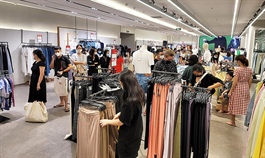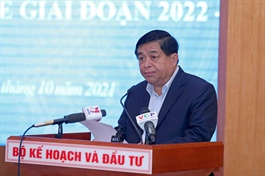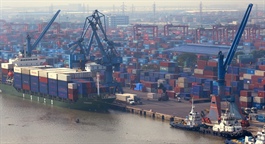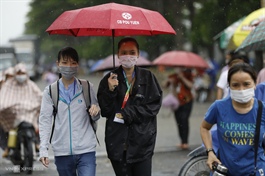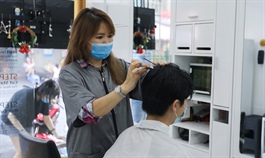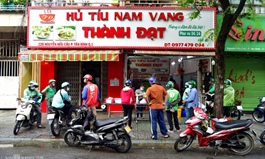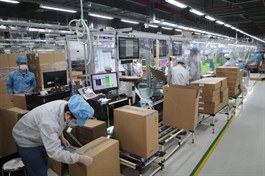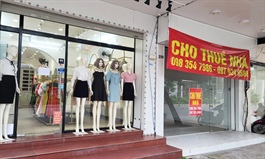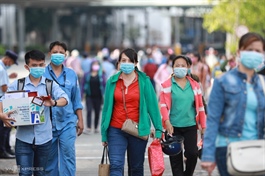European firms strive to maintain operations in Vietnam
European firms strive to maintain operations in Vietnam
Eurocham members said they are ensuring their workplaces are safe amid the continuing threat of Covid-19 and that they are optimistic about their future in Vietnam.
At the end of September, HCMC lifted social distancing requirements, enabling businesses to resume normal operations after more than four months of strict lockdowns to contain the pandemic.
European companies have focused on ensuring workplace safety and it continues to be their top priority. They regularly check employees’ temperature and test them and follow social distancing requirements.
Torben Minko, managing director of medical equipment manufacturer B. Braun Vietnam Co., Ltd, told VnExpress International that his company has been scrupulously complying with measures such as temperature checks, disinfection and social distancing.
Workers' well-being is a priority, he said.
As a result, they have felt safe about coming to work, he said.
Besides, office workers could choose to work from home since the company only needs 15-20 percent of them at the workplace, he said.
A risk committee supervises all operations based on the guidance from the government, and this has ensured the highest safety for employees and mitigated any risk of outbreaks, he said.
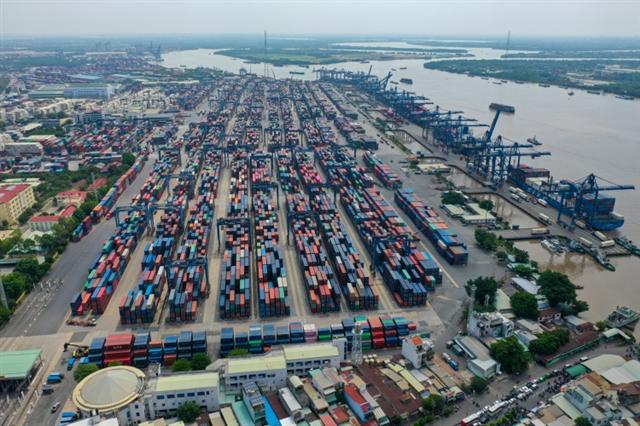
Containers seen at Cat Lai Port in Ho Chi Minh City in April 2021. Photo by VnExpress/Quynh Tran |
Claudia Anselmi, CEO of Hung Yen Knitting and Dyeing Co,. Ltd, hoped all her 330 workers would be fully vaccinated by the end of this year. Some 80 percent have got their first shot.
Many European companies have been able to sustain their operations through the lockdowns.
Minko said his firm is running at around 95 percent of capacity in Vietnam.
Around 94 percent of its 1,500 workers have received the first vaccine shot, and 25 percent are fully immunized, and he hoped everyone would get two shots soon. B. Braun has donated to the government vaccination fund.
Gabor Fluit, CEO Asia of De Heus Animal Nutrition, a Dutch animal feed producer, said the vaccination rates among his 2,000 employees are higher than 80 percent, in which more than 60 percent (with one shot) and 20 percent (with two shots).
According to Eurocham Chairman Alain Cany, the organization is in almost constant contact with national and provincial authorities to help its members resolve difficulties they face and keep operating wherever it is safe to do so.
It has sought permission for its members to remain open even if some employees contract Covid, quarantining them, instead of shutting down, and urged the government to allow free movement of goods between provinces.
Eurocham remains in high-level dialogue with the government, proposing solutions to get businesses open again as safely and quickly as possible while countries learn to live with the virus.
Bright sides for future development
Fluit said there were some positive changes in Vietnam’s Covid policies.
Ho Chi Minh City has allowed most public and private production and service businesses to reopen on October 1, except some still considered high risk.
Authorities in some provinces like Long An and Dong Nai are allowing firms to quarantine employees who test positive and remain open.
Fluit saw this as "a big improvement", one that reduces the risk of business interruption.
The government also allows businesses to conduct Covid tests for their workers instead of by the authorities, which allows cost and time saving and enable better focus on business activities, he pointed out.
"We believe the Vietnamese economy will recover next year. Covid is a problem in the short term, however prospects are still very positive in the medium and long term."
Anselmi said: "Covid does not make us change our investment plans."
Some foreign firms also said Vietnam's eco-friendly growth policies and free trade agreements with the EU, South Korea, Japan, and Australia favor sustainable development.
Minko said his company is planning to double its $100 million investment in the country in the next couple of years.
Vietnam should simplify entry procedures for foreign experts so that they could come and help set up new plants, he said.
It now takes weeks for them to complete the processed for entry. He said his company needs on average 30 experts a year but they could not come this year.
Cany said with vaccination rates on the rise and provinces slowly reopening, things are moving in the right direction.
"We encourage the government to go further and faster so that both companies and communities can return to normal life as soon as possible."



